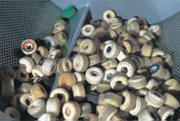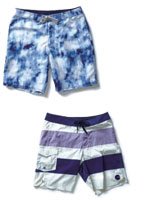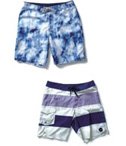Analog Expands 'Wheel Wash' From Denim to Clothing
When Joey Jorgensen, design director for skate lifestyle company Analog, was brainstorming new denim ideas with Ever President Jason Bleick, they found the answer in one of their favorite toys. To replace traditional stonewashing, Jorgensen tumbled the jeans around with buckets full of skateboard wheels.
“People have been using some alternative things in wash processes for a while. Golf balls; rubber balls; obviously, stone, etc. ... We’re just implementing a new material that has a unique outcome and a great story that involves our end user in the manufacturing process,” Jorgensen said.
The first samples were tested at denim washhouses in Los Angeles—after some persuading that it was harmless to dump skate wheels into the wash machines—and Analog launched its first jeans featuring the “Wheel Wash” about two years ago. The “Wheel Wash” jeans have now become a signature of the company’s denim program.
For Spring 2012, Analog expands the wheel wash into non-denim items of the clothing collection such as cotton T-shirts, yarn-dyed striped cotton woven shirts, cotton/nylon boardshorts, cotton/polyester chino shorts and stretch-cotton chinos. Following for Fall 2012, the brand will wash fleece, flannels and jacketing with skateboard wheels, too.
In the case of denim, the fluid skate wheels are not as abrasive as stones, resulting in a softer and worn-in feeling. Jorgensen explains that “the finish process is the same” in non-denim fabrics.
“It softens and kind of pulverizes the fabrics so they feel really broken in with loftier, soft handfeel. The degree to which we can achieve this is determined by the base fabric— since the wheels are generally pretty smooth, they don’t break the actual fibers down like a typical stone wash or a sanded/brushed finish would.”
Wash treatments vary from medium to heavy, depending on how the different fabric content of the item reacts to the wash and how worn he wants the garment to look. “The longer we wash down, the lighter color/softer the end result. So we take it on a case-bycase basis to achieve the final look we’re shooting for,” Jorgensen said.
A typical production season requires about 500 to 1000 wheels, which means that hunting and gathering wheels is a campaign in itself. The very first test runs were gathered from friends, and now that production is running, Analog calls upon its customers to make quota. In addition to retail displays that tell the brand’s wash story, Analog partnered with 70 retail shops throughout North America where kids could donate their old skateboard wheels into a collection bin. Donors will receive a “Contributor” T-shirt and can register to win other Wheel Wash products. The shop that collects the most wheels will win a $1,000 prize—which can be used for a celebratory party or be donated to the shop’s favorite nonprofit organization. —Rhea Cortado
























